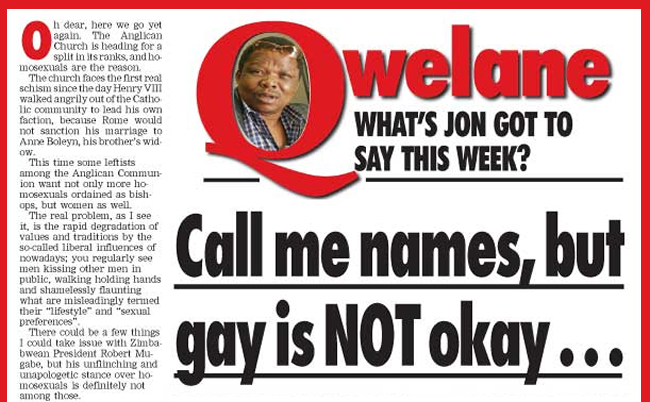The Centre for Human Rights, Faculty of Law, University of Pretoria, through its Sexual Orientation, Gender Identity and Expression (SOGIE) Unit, applauds last week’s judgment by the High Court of South Africa Gauteng Local Division in Johannesburg, sitting as an equality court, in the matter of the South African Human Rights Commission v Jon Qwelane. The Court found that Qwelane’s derogatory comments about gays, published in 2008, constituted hate speech, and ordered him, within 30 days, to apologise unconditionally to the lesbian, gay and bisexual community.
After receiving a wave of complaints about these comments, the South African Human Rights Commission in 2009 submitted a case alleging a breach of the Promotion of Equality and Prevention of Unfair Discrimination Act of 2000 (PEPUDA 2000) for writing a column article against homosexuality, published in the Sunday Sun newspaper. This has been a protracted affair, due mainly by Mr Qwelane’s failure to attend the Court’s initial sitting; and his subsequent attempts to have the relevant provisions of PEPUDA declared unconstitutional.
In the column, titled ‘Call me names, but gay is NOT okay’, Mr Qwelane wrote that homosexuals were to blame for the split in the ranks of the Anglican Church because leftists in the church wanted more homosexuals and women clergy to be ordained as bishops. In the same breath, he lauded Zimbabwean President Robert Mugabe for his ‘unflinching and unapologetic stance’ on homosexuality. Mr Qwelane othered the LGBTI community by calling them ‘these people’ and wrote that they had something ‘against the natural order of things’. He challenged South African politicians with ‘balls’ to rewrite the Constitution of South Africa to, in his words, ‘excise those sections which give license to men marrying other men, and ditto women’. He further equated homosexuality with bestiality when he wrote: ‘Otherwise at this rate, how soon before some idiot demands to ‘’marry’’ an animal, and argues that this Constitution ‘’allows’’ it?’
The case was brought under sections 10, 11 and 12 of PEPUDA. Section 10 of PEPUDA prohibits the publication, propagation, advocating and communication of hateful, hurtful, harmful and inciting words against a group based on the prohibited grounds for unfair discrimination enshrined in section 9(3) of the Constitution of the Republic of South Africa. Two of the prohibited grounds for unfair discrimination in the South African Constitution are sexual orientation and marital status. Section 11 prohibits harassment of one person by another and section 12 prohibits the dissemination, broadcasting, publishing, or display of any advertisement, notice or information that is intended to discriminate against any person.
The Centre for Human Rights is delighted that the law has taken its course and justice has been served – even if it took almost ten years. Mr Qwelane’s negative and hateful disposition towards homosexuality and by proxy the homosexual, transgender and intersex community manifested itself in many other copycat hateful utterances over the years after the publication of his column. Hate begets hate.
It should be recalled that following his hateful column, as if being rewarded, President Zuma appointed Mr Qwelane as South Africa’s Ambassador to Uganda in 2010. The reason for his appointment was never clear, as his credentials did not extend much beyond being a newspaper columnist, and a bigot. In a perverse turn of events, he thus became a representative of a constitutionally democratic and liberal South Africa to a country that was just beginning to discuss the promulgation of an anti-gay law that initially at that time prescribed the death penalty for homosexuals. The Anti-Homosexuality Bill of Uganda later became law, but the Constitutional Court of Uganda subsequently declared it unconstitutional, on a technicality, after a petition by a group of human rights organisations in that country.
Mr Qwelane’s utterances in writing can therefore be said to have directly contributed to the determination to make a law criminalising minority sexual and gender identities in that country. His support of President Robert Mugabe’s disdain for homosexual Zimbabweans added to the voices on the continent creating a hostile social, political and legal environment for LGBTI Africans.
South Africa, Mr Qwelane’s home country, has seen its fair share of discrimination and violence against lesbians, gays, bisexuals and transgender individuals. In a South African study conducted in 2016 by OUT LGBT, a Pretoria-based organisation under its ‘Love Not Hate Campaign’, the following were established:
- 55% of the LGBT respondents surveyed said they feared being discriminated in their everyday life;
- 56% said they had experienced discrimination while in school because of their different sexual orientation or gender identity/expression and;
- 56% said they had been verbally insulted at school because of their different sexual orientation or gender identity/expression.
The Centre for Human Rights calls upon Mr Qwelane to obey the orders of Court and unconditionally apologise to the LGBTI community for his hateful words. The likes of Mr Qwelane have contributed to the hateful rhetoric against homosexuals, transgender and intersex Africans that has led to the ostracisation, killing, rape and discrimination of people based on their sexual orientation and gender identity.
The Centre for Human Rights demands that the South African, and other African governments, strengthen laws that effectively stop hate-speech and hate crimes against all minority groups including lesbians, gays, bisexuals, transgender and intersex persons.
For more information, please contact:
Prof Frans Viljoen
Director
Centre for Human Rights
Faculty of Law, University of Pretoria
Tel: +27 (0) 12 420 3228
frans.viljoen@up.ac.za
www.chr.up.ac.za
or
Mr Geoffrey Ogwaro
Manager: Sexual Minority, Gender Identity & Expression Unit
Centre for Human Rights
Faculty of Law, University of Pretoria
Tel +27 (0) 61 461
geoffrey.ogwaro@up.ac.za | geoffreyogwaro@gmail.com
www.chr.up.ac.za


